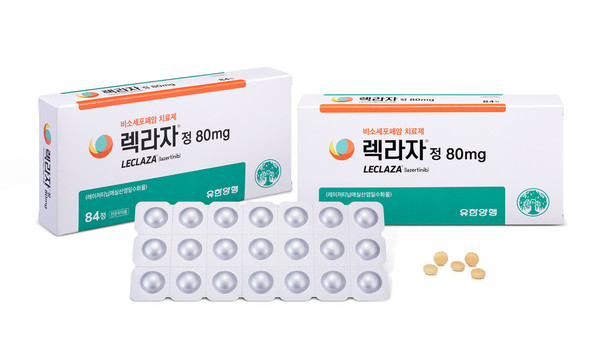The Ministry of Food and Drug Safety (MFDS) has approved an expanded indication for Yuhan Corp.'s Leclaza (ingredient: lazertinib), an epidermal growth factor receptor (EGFR) mutation-positive non-small cell lung cancer (NSCLC) treatment, to be used as first-line treatment.

Leclaza is the 31st new drug developed in Korea and is an oral, highly potent, mutant-selective, and irreversible EGFR tyrosine kinase inhibitor (TKI) that targets both the T790M mutation and active EGFR mutations as a third-generation non-small cell lung cancer (NSCLC) treatment. The drug initially received approval as a second-line treatment for locally advanced or metastatic EGFR mutation-positive NSCLC.
Yuhan applied for the change based on the results of the phase 3 clinical trial in patients with NSCLC.
According to the study published in the Journal of Clinical Oncology on Thursday, Leclaza recorded 20.6 months of median progression-free survival (mPFS) in a LASER301 global three-phase clinical study to confirm the first-line treatment effect of EGFR mutant NSCLC patients.
Specifically, Leclaza's mPFS in EGFR-mutated NSCLC patients was more than double that of AstraZeneca’s Irressa (gefitinib) at 9.7 months in the LASER301 study.
Secondary endpoints like the objective response rate (ORR) were both 76 percent, and the duration of response (DOR) in the Leclaza group was 19.4 months, while the Iressa group was 8.3 months. Additionally, the overall survival (OS) rate was 80 percent in the Leclaza group, compared to 72 percent in the Iressa arm.
After a thorough scientific review and evaluation of the submitted data, the MFDS said it expanded the scope of patients to include first-line treatment of locally advanced or metastatic NSCLC patients with EGFR mutation exon 19 deletion or exon 21 substitution.
"We expect that this change will expand the range of drug options for patients with NSCLC, and we will continue to do our best to provide safe and effective treatments to the Korean people quickly based on our regulatory science expertise," an MFDS official said.
Yuhan is also seeking Leclaza’s expanded indication as a first-line NSCLC treatment in the U.S. this year.
Industry watchers expect the Korean government will likely reimburse both Leclaza and AstraZeneca's Tagrisso soon.
Yuhan recently announced an Early Access Program (EAP) that will provide patients with free access to Leclaza until it wins reimbursement for the first-line indication.
This is likely to hurt the sales of its competitor Tagrisso, industry sources said.
AstraZeneca also has a program through the Korea Blood Disease & Cancer Association that covers a portion of the cost of Tagrisso for patients. However, the program covers only 30 percent of the cost. Tagrisso, non-reimbursed, costs about 6 million won ($4,552) per month in Korea.
"If Leclaza is released to the clinic free of charge, it is quite obvious who will win the competition early on," an industry watcher told Korea Biomedical Review, asking to remain anonymous due to the sensitivity of the issue.
Related articles
- Lung cancer drug Leclaza proves benefit through real-world data
- Tagrisso vs. Leclaza – let the best drug win
- [Top K-Pharma Analysis ⑤] Yuhan goes all-in in new drug R&D, despite profit decline
- ‘Leclaza showed consistent global PFS results as 1st-line NSCLC treatment’
- Leclaza shows benefits of homegrown new drug
- [Reporter’s notebook] What the government misses by not reimbursing Tagrisso
- Yuhan's NSCLC drug Leclaza passes first hurdle for reimbursement expansion

